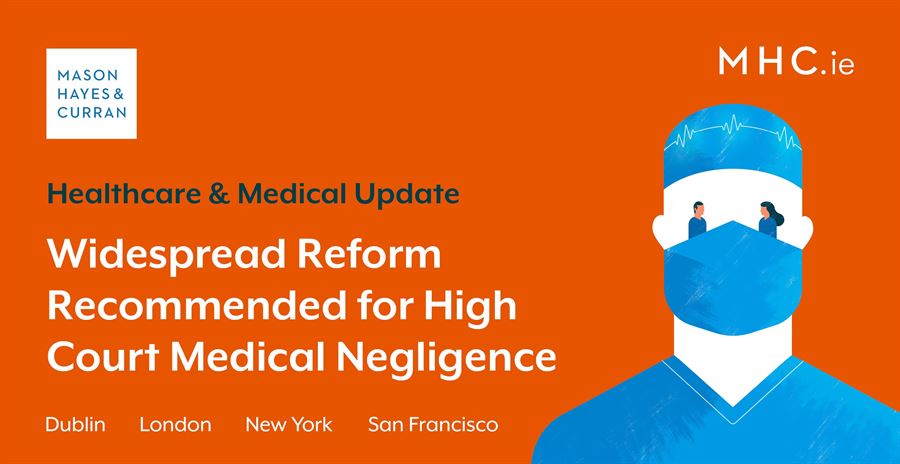Widespread Reform Recommended for High Court Medical Negligence Litigation

In recent years, there has been considerable commentary on the management of clinical negligence claims.
Following a government decision in March 2017, a Review Group was established to review and reform the administration of civil justice in Ireland. The Review Group recently published its recommendations in late 2020. We discuss the recommendations that apply to procedures for managing medical negligence claims.
Pre-action protocols
While provision was made for the introduction of pre-action protocols (PAPs) in the Legal Services Regulation Act 2015, nothing has been implemented to date. PAPs would prompt prospective litigants to make early disclosure of the specific nature of their claim. They would also narrow areas of disagreement and cause the parties to consider alternatives to litigation. The Review Group recommended early implementation of PAPs in medical negligence cases by way of introduction of Ministerial regulations.
An Expert Group chaired by Mr Justice Charles Meenan made a similar recommendation in December 2020, noting that a statutory instrument was being drafted for PAPs.
Case management
The Review Group is not the first group to support case management by the courts, with various recommendations tabled since 2010. Indeed, the Meenan Expert Group recently made a similar recommendation. The courts have engaged in case management of medical negligence cases on an ad hoc basis. This happens most often where cases are fast tracked due to hardship or limited life expectancy. Generally the courts will set timelines and enforce them where necessary. There are clear benefits to this for all parties, although the pace of progression of these cases raises due process concerns.
Progress on a formal case management system has however been languishing.
Clinical Negligence List
To date, medical negligence actions have been treated by the High Court in almost the same way as general personal injury actions. The Review Group recommended a separate and bespoke High Court Clinical Negligence List. This is a practical recommendation and would mean that medical negligence cases would no longer be included in the Personal Injuries List. Notably, this change was also recommended recently by the Meenan Expert Group.
This, together with PAPs, would be a welcome change that should be embraced by legal professionals, indemnifiers and plaintiffs as it would also increase the efficiency and throughput of these cases. In tandem, there would also be a resultant reduction in costs and prompt resolution of cases, which by their very nature are particularly sensitive for both plaintiff and defendant. However, the implementation of this specific list will most likely depend on the availability of judicial resources. Only time will tell whether it will be implemented.
Pleadings reform
To ensure that the real issues in dispute are identified prior to trial, the Review Group recommended a change in the relevant rules of court. This change would require greater precision in pleadings. It recommended achieving this goal by using the provisions of the Civil Liability and Courts Act 2004 as the model for amended rules.
Further, the State Claims Agency’s suggestion that consideration be given to imposing an obligation on plaintiffs to distinguish clearly between pre-existing medical conditions and the specific injuries caused by the alleged medical negligence was endorsed. This obligation would expedite the investigation of medical negligence claims thereby reducing costs and unnecessary delay. This recommendation is very much welcomed and should be in everyone’s interests.
Notice for particulars and notice for further information
The Review Group considered that parties in personal injuries actions should be required to raise a single combined or composite notice. This would streamline the current practice of raising separate notices for particulars and notices for further information.
Periodic Payment Orders
While welcoming the legislative provision for Periodic Payment Orders (PPOs) used in catastrophic injury cases, the Review Group acknowledged that due to the lack of an index of healthcare sector inflation, PPOs are not being used by plaintiffs. This is largely due to the risk of incurring a shortfall for future care and other costs in any PPO award made. The Review Group recommended an assessment, with assistance from the Central Statistics Office, to determine a replacement index that would address relevant inflation. The Review Group referred to the index used in the UK, the Annual Survey of Hours and Earnings (ASHE).
Notably, during the summer of 2020, the Minister for Justice sought submissions on the personal injury discount rate, also known as the real rate of return, and how it should be set.
With the future of PPOs in Ireland remaining uncertain, we await any developments in this area with great anticipation.
Lodgement and tender procedure
The Review Group recommended that the rules of court be extended to allow for the making or increase of a lodgement or tender without permission of court where the plaintiff delivers a further medical report. These are offers made by a Defendant during the proceedings. If the Plaintiff is not awarded a higher figure, these offers can be relied upon by the Defendant in assessing costs at the conclusion of the case. The extent of the practical impact of this proposed change may be limited. This is because a plaintiff is only required to deliver medical reports when complying with the Disclosure Rules at quite a late stage in the proceedings. That said, it further signifies the trend in favour of early disclosure of the specific nature of a claim and the encouragement of early resolution, which should be welcomed.
Conclusion
It remains to be seen whether all of the Review Group’s recommendations will be implemented. Some of the changes recommended would have a significant impact on how medical negligence claims are progressed in Ireland.
The Report in full can be accessed here.
For more information, please contact a member of our Dispute Resolution team.
The content of this article is provided for information purposes only and does not constitute legal or other advice.
Share this:



